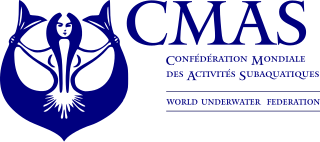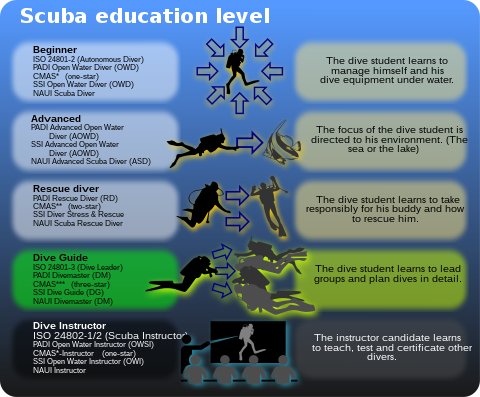
The Professional Association of Diving Instructors (PADI) is a recreational diving membership and diver training organization founded in 1966 by John Cronin and Ralph Erickson. PADI courses range from entry level to advanced recreational diver certification. Further, they provide several diving skills courses connected with specific equipment or conditions, some diving related informational courses and a range of recreational diving instructor certifications. They also offer various technical diving courses. As of 2020, PADI claims to have issued 28 million scuba certifications. The levels are not specified and may include minor specialisations. Some of the certifications align with WRSTC and ISO standards, and these are recognised worldwide. Some other certification is unique to PADI and has no equivalence anywhere, or may be part of other agencies' standards for certification for more general diving skill levels.
A divemaster (DM) is a role that includes organising and leading recreational dives, particularly in a professional capacity, and is a qualification used in many parts of the world in recreational scuba diving for a diver who has supervisory responsibility for a group of divers and as a dive guide. As well as being a generic term, 'Divemaster' is the title of the first professional rating of many training agencies, such as PADI, SSI, SDI, NASE, except NAUI, which rates a NAUI Divemaster under a NAUI Instructor but above a NAUI Assistant Instructor. The divemaster certification is generally equivalent to the requirements of ISO 24801-3 Dive Leader.
The National Association of Underwater Instructors is a nonprofit association of scuba instructors founded in 1960 by Albert Tillman and Neal Hess.

Recreational diver training is the process of developing knowledge and understanding of the basic principles, and the skills and procedures for the use of scuba equipment so that the diver is able to dive for recreational purposes with acceptable risk using the type of equipment and in similar conditions to those experienced during training.

Recreational diving or sport diving is diving for the purpose of leisure and enjoyment, usually when using scuba equipment. The term "recreational diving" may also be used in contradistinction to "technical diving", a more demanding aspect of recreational diving which requires more training and experience to develop the competence to reliably manage more complex equipment in the more hazardous conditions associated with the disciplines. Breath-hold diving for recreation also fits into the broader scope of the term, but this article covers the commonly used meaning of scuba diving for recreational purposes, where the diver is not constrained from making a direct near-vertical ascent to the surface at any point during the dive, and risk is considered low.
Scuba Schools International (SSI) is a for-profit organization that teaches the skills involved in scuba diving and freediving, and supports dive businesses and resorts. SSI has over 3,500 authorized dealers, 35 regional centers, and offices all over the world.

The Israeli Diving Federation (TIDF) is a non-governmental SCUBA diving training organization based in Israel.

Scuba Diving International (SDI) is a Scuba training and certification agency. It is the recreational arm of Technical Diving International, a technical diver training organization.
The World Recreational Scuba Training Council (WRSTC) was founded in 1999 and is dedicated to creating minimum recreational diving training standards for the various recreational scuba diving certification agencies across the world. The WRSTC restricts its membership to national or regional councils. These councils consist of individual training organizations who collectively represent at least 50% of the annual diver certifications in the member council's country or region. A national council is referred to as a RSTC.

Rescue Diver is a scuba diving certification level provided by several diver training agencies, such as PADI, SSI, SDI, and NAUI, which emphasises emergency response and diver rescue.
Master Scuba Diver (MSD) is a scuba diving certification or recognition level offered by several North American diver training agencies, such as the National Association of Underwater Instructors (NAUI), the Professional Association of Diving Instructors (PADI), Scuba Diving International (SDI), and Scuba Schools International (SSI). Other agencies offer similar programs under other names, such as "Elite Diver". Each of these agencies touts their program at this level as the highest, non-leadership program.

The World Underwater Federation orCMAS is an international federation that represents underwater activities in underwater sport and underwater sciences, and oversees an international system of recreational snorkel and scuba diver training and recognition. It is also known by its Spanish name, Confederación Mundial De Actividades Subacuáticas. Its foundation in Monaco during January 1959 makes it one of the world's oldest underwater diving organisations.

Open Water Diver (OWD) is an entry-level autonomous diver certification for recreational scuba diving. Although different agencies use different names, similar entry-level courses are offered by all recreational diving agencies and consist of a combination of knowledge development (theory), confined water dives and open water dives (experience) suitable to allow the diver to dive on open circuit scuba, in open water to a limited depth and in conditions similar to those in which the diver has been trained or later gained appropriate experience, to an acceptable level of safety.

A diving instructor is a person who trains, and usually also assesses competence, of underwater divers. This includes freedivers, recreational divers including the subcategory technical divers, and professional divers which includes military, commercial, public safety and scientific divers.

Autonomous diver is an international minimum standard for entry-level recreational scuba diver certification. It describes the minimum requirements for basic training and certification for recreational scuba divers in international standard ISO 24801-2 and the equivalent European Standard EN 14153-2. Various organizations offer training that meets the requirements of the Autonomous Diver standard. A certification which corresponds to Autonomous Diver allows for independent diving with a dive buddy in open water. Most training organizations do not recommend exceeding a depth of 18 or 20 meters at this level of certification. After completion of this certification the training can be extended to a dive leader to ISO 24801-3 or an intermediate not defined by international standards.

Supervised diver specifies the training and certification for recreational scuba divers in international standard ISO 24801-1 and the equivalent European Standard EN 14153-1. Various diving organizations offer diving training that meets the requirements of the Supervised Diver. A diving certification which corresponds to the Supervised Diver allows for recreational diving under the direct supervision of a divemaster or recreational diving instructor in open water. Most diving organizations recommend not to exceed a diving depth of 10 to 12 metres. After the successful completion of a training equivalent to the Supervised diver, training can be extended to the Autonomous diver certification level.
Dive leader is the title of an internationally recognised recreational diving certification. The training standard describes the minimum requirements for dive leader training and certification for recreational scuba divers in international standard ISO 24801-3 and the equivalent European Standard EN 14153-3. Various organizations offer training that meets the requirements of the dive leader standard. Some agencies use the title "Dive Leader" for their equivalent certification, but several other titles are also used, "Divemaster" may be the most widespread, but "Dive Supervisor" is also used, and should not be confused with the very different status and responsibilities of a professional diving supervisor. CMAS affiliates certifications which meet the requirements of CMAS 3-star diver should meet the standard by default. The occupation of a dive leader is also known as "dive guide", and is a specialist application of a "tour guide".

Introductory diving, also known as introductory scuba experience, trial diving and resort diving are dives where people without diver training or certification can experience scuba diving under the guidance of a recreational diving instructor. Introductory diving is an opportunity for interested people to find out by practical experience at a relatively low cost if they would be interested in greater involvement in scuba diving. For scuba instructors and diving schools is it an opportunity to acquire new customers. An introductory diving experience is much less time-consuming and costly than the completion of autonomous diver training, but has little lasting value, as it is an experience program only, for which no certification is issued. Introductory scuba diving experiences are intended to introduce people to recreational diving, and increase the potential client base of dive shops to include people who do not have the time or inclination to complete an entry-level certification program.
Recreational diver course referral is a system intended to facilitate completion of training for open water recreational scuba diving students who intend to do their training dives at a place different from the venue for the theory and confined water training. Referral systems within a specific training agency were the original format, but as more universally recognised training standard such as those of the recreational Scuba Training Council, and more recently the ISO and EUF standards have been adopted by most training agencies, it has become possible to expand the system to function across agencies. Referrals within a certification agency are relatively uncontroversial as the agency training standards are expected to be fairly uniform. Cross-agency referrals can occasionally raise problems where the standards differ significantly, as the instructor completing the training may not be entirely familiar with the relevant s requirements.
Recreational scuba certification levels are the levels of skill represented by recreational scuba certification. Each certification level is associated with a specific training standard published by the certification agency, and a training programme associated with the standard., though in some cases recognition of prior learning can apply. These levels of skill can be categorised in several ways:







